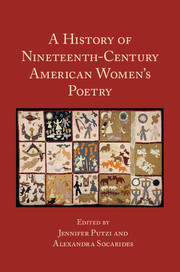Book contents
- Frontmatter
- Contents
- List of Illustrations
- List of Contributors
- Acknowledgments
- Introduction: Making History: Thinking about Nineteenth-Century American Women's Poetry
- PART I 1800–1840, AMERICAN POESIS AND THE NATIONAL IMAGINARY
- PART II 1840–1865, UNIONS AND DISUNIONS
- 8 Women, Transcendentalism, and The Dial: Poetry and Poetics
- 9 Poets of the Loom, Spinners of Verse: Working-Class Women's Poetry and The Lowell Offering
- 10 Women's Transatlantic Poetic Network
- 11 Making and Unmaking a Canon: American Women's Poetry and the Nineteenth-Century Anthology
- 12 “What witty sally”: Phoebe Cary's Poetics of Parody
- 13 Nineteenth-Century American Women's Poetry of Slavery and Abolition
- 14 Fever-Dreams: Antebellum Southern Women Poets and the Gothic
- 15 The Civil War Language of Flowers
- 16 Poetry and Bohemianism
- PART III 1865–1900, EXPERIMENT AND EXPANSION
- Suggested Further Reading
- Index
8 - Women, Transcendentalism, and The Dial: Poetry and Poetics
from PART II - 1840–1865, UNIONS AND DISUNIONS
Published online by Cambridge University Press: 21 January 2017
- Frontmatter
- Contents
- List of Illustrations
- List of Contributors
- Acknowledgments
- Introduction: Making History: Thinking about Nineteenth-Century American Women's Poetry
- PART I 1800–1840, AMERICAN POESIS AND THE NATIONAL IMAGINARY
- PART II 1840–1865, UNIONS AND DISUNIONS
- 8 Women, Transcendentalism, and The Dial: Poetry and Poetics
- 9 Poets of the Loom, Spinners of Verse: Working-Class Women's Poetry and The Lowell Offering
- 10 Women's Transatlantic Poetic Network
- 11 Making and Unmaking a Canon: American Women's Poetry and the Nineteenth-Century Anthology
- 12 “What witty sally”: Phoebe Cary's Poetics of Parody
- 13 Nineteenth-Century American Women's Poetry of Slavery and Abolition
- 14 Fever-Dreams: Antebellum Southern Women Poets and the Gothic
- 15 The Civil War Language of Flowers
- 16 Poetry and Bohemianism
- PART III 1865–1900, EXPERIMENT AND EXPANSION
- Suggested Further Reading
- Index
Summary
On November 6, 1839, more than twenty-five women met in Boston, probably in the home of Mary Peabody, to participate in the first of a series of formal Conversations on classical literature and mythology led by the brilliant Transcendentalist Margaret Fuller. In attendance was Elizabeth Palmer Peabody, the eminent educational reformer and intellectual who would soon host subsequent sessions of Fuller's Conversations for women in her West Street bookstore, the most important Transcendentalist gathering-place in Boston. Also in attendance at Fuller's first Conversation were, among others, Caroline Sturgis and her sister Ellen Sturgis Hooper, both of whose poems would be featured in the Transcendentalist journal The Dial, and other women who were or would become prominent activists and writers, including Lydia Maria Child, Elizabeth Cady Stanton, and Caroline Healey Dall. At this point, Fuller's and Peabody's Transcendentalist activities were already in full swing – Fuller had accepted the job as editor of The Dial only days before – and the success of this inaugural Conversation and those that followed ensured many women's active participation in the growth of Transcendentalism and heralded their eagerness to be drawn into its intellectual and literary fervor.
American Transcendentalism was a movement formed by a loosely organized nexus of intellectuals, writers, and clergymen centered in Boston in the 1830s and 1840s. With the sense that they were fomenting a cultural revolution, they turned away from the Lockean empiricism and rationalism that dominated New England's liberal Christianity and fervently pursued their own version of German Idealism, embracing intuitive ways of knowing and positing the divinity of the human soul. From these ideas sprang a series of reform efforts in education, civil rights, and communitarian (or sometimes hermetic) living, as well as a new way of understanding the origin and function of poetic language. While many of our accounts of the movement and its literature have tended to prioritize the careers of men such as Ralph Waldo Emerson, Henry David Thoreau, Bronson Alcott, and William Ellery Channing, Peabody and Fuller's leadership was crucial not only to the inclusion of women in Transcendentalist circles, but also to the development of the movement itself, including its new conceptions of poetry and other literary forms.
- Type
- Chapter
- Information
- A History of Nineteenth-Century American Women's Poetry , pp. 139 - 154Publisher: Cambridge University PressPrint publication year: 2016
- 1
- Cited by

